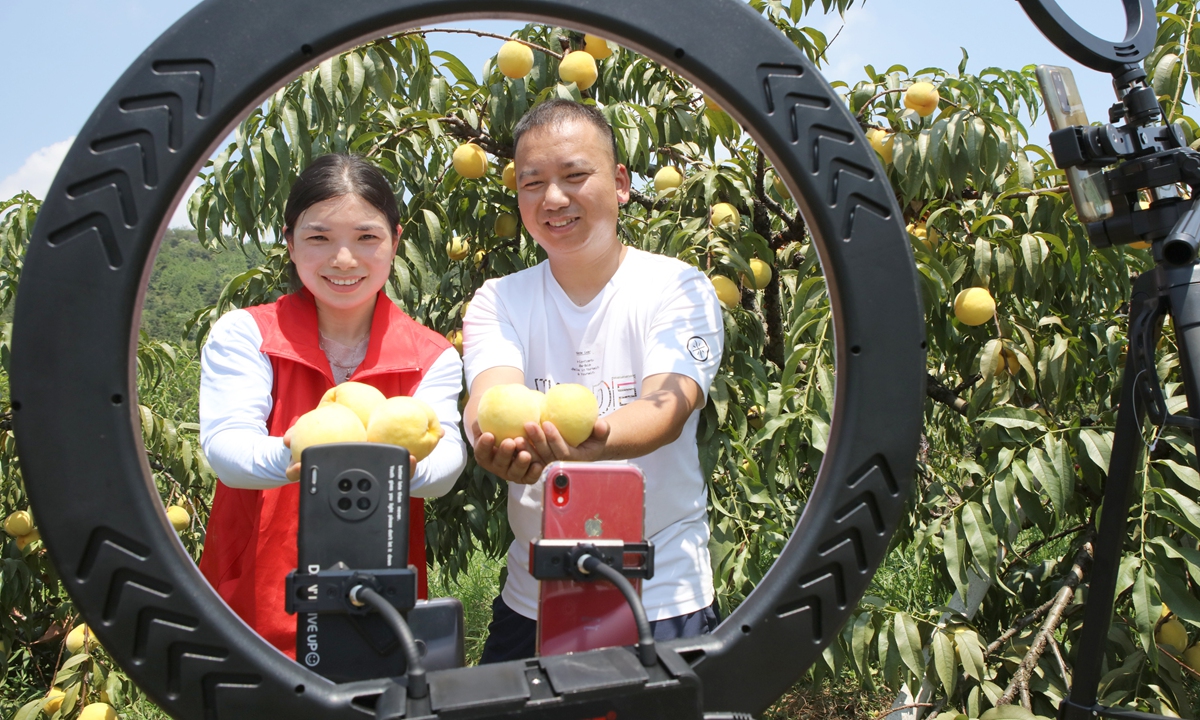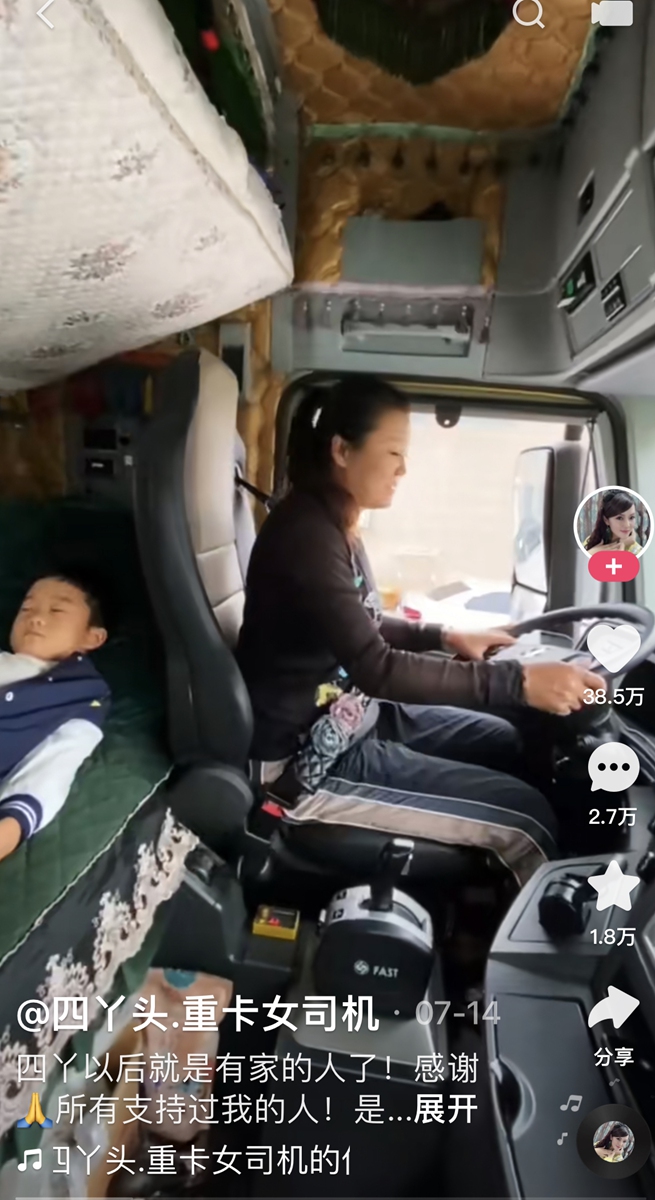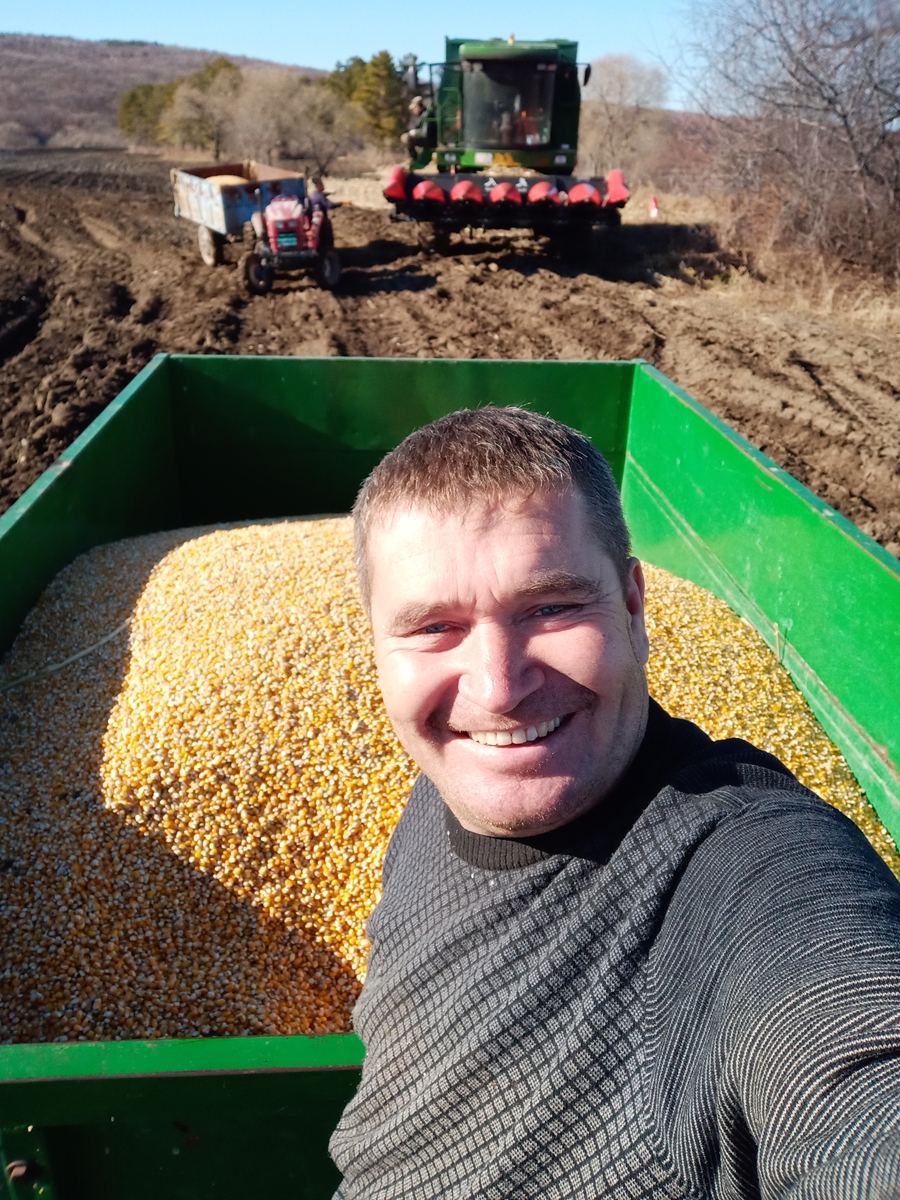
Farmers and volunteers in Yichun, East China's Jiangxi Province, recommend yellow peaches via a livestream feed and short videos on July 30, 2022. Photo: VCG
The popularity of small-town and rural bloggers online across China's short-format video platforms are blazing the trail in new trends across China, and revealed a true, diverse, and dynamic Chinese society.
As the most popular short-format video platforms, Kuaishou and Douyin continue to offer windows into China's rural life. Rural bloggers are becoming increasingly comfortable in using their smartphones to showcase their ordinary yet colorful lives and diverse values to netizens around the world. It is also a convenient way for young Chinese urbanites to indulge in a yearning for a less stressful, vibrant rural life amid the narrowing gap in living standards between urban and rural areas.
Amateur shooting and editing skills haven't hindered rural content creators from attracting millions of fans who are impressed by the powerful and confident self-expression via shaky cameras.
Videos showing authentic rural lives remain highly popular across numerous social media platforms. Technological advancements have made the sharing of ordinary people's lives easier and far more realistic, while showing others how rural daily life is really like, which is worth recording to inspire others, Zhang Yiwu, a Peking University professor, told the Global Times.
Young people in cities are curious about the diversity of Chinese society, and they are often buoyed by the optimism and tenacity of the people shown in the videos going about their daily routines or completing challenging tasks, said Zhang. The great values and life attitudes such as optimism, dedication, and freedom are all delivered in the short videos, Zhang noted.
In the past decade or so, short videos on rural life have recorded the big leap and governmental efforts in the development of China's countryside.
Kuaishou, the video platform replete with many rural curious and even crude videos relying on a misery angle to attract attention in earlier times nearly a decade ago, has since witnessed how China's rural communities have gradually emerged from the backwaters of society to prosperity, which demonstrates the country's successful fight against poverty and improved infrastructure, Zhang said.
Traversing with truckersTruckers have become a highly visible group across the Kuaishou platform as many of them love to share their work and life on the road in short videos, taking the netizens everywhere they go.
Through their recordings and posts on short video platforms, tens of millions of people can accompany them on their long, dull journeys, witnessing how they whip up delicious meals on the road in makeshift kitchens at stovetops, and how they help their peers in late-night emergencies.
According to data from Kuaishou in March, more than 90 percent of truck drivers across the platform are men. Among them, more than 80 percent are rural residents, and nearly 70 percent have only received a junior high school education or below.
"Siyatou" from Inner Mongolia is one of the few women among China's truck drivers. She is the only female truck driver at the Ordos mine in her hometown where she has been ferrying coal for 10 years, she told the Global Times.
As an "online celebrity" with more than 4 million followers, she often shares stories about villages she visits in her travels and helps villagers sell goods in her spare time. With millions of people along for the ride virtually, she said she does not feel lonely anymore.
"Shoveling frozen coal in chilly weather, climbing coal heaps to unload the coal, and drilling under the truck to repair tires," she conveys her real daily routine unfamiliar to most people in urban areas.
She decorated the truck cabin in a princess theme and even installed a microphone stereo. She livestreams at mid-night to share stories on the journey or to sell local specialties.
As a divorced single mother, she not only supported her ex-husband to pay off a 500,000-yuan debt, but also bought a new truck for herself, and plans to buy a new house.

Vlogger Siyatou en route in her truck with her child onboard.Photo: Screenshot of Siyatou's short video
Her more than 700 videos reveal the wandering, hardship, and toil endured by this group, as well as their kindness, tenacity, and confidence in life.
Throughout 2020, Siyatou, along with 17.28 million other truckers, ferried 74 percent of the year's total cargo transported across China. They can be seen everywhere from Xizang to the border crossings between Guangdong Province and Hong Kong region.
Behind this figure are China's leaps and bounds in infrastructural development over the last few decades.
By April 2021, China's total length of expressways had reached 160,000 kilometers, ranking first in the world, amid Chinese economy's development.
Capturing serene frontier village
With blue eyes, flaxen hair, and fair skin, 44-year-old Dong Desheng, a native born farmer who attracted much attention for his "exotic appearance," infectious enthusiasm, and boyish charm on streaming platforms, is an ethnic Russian, one of China's 56 officially recognized ethnic groups.

Dong Desheng (Uncle Petrov) takes a selfie in a cornfield. Photo: Courtesy of Dong
He lives in Xunke county, Northeast China's Heilongjiang Province.
The farmer, who talks in fluent, northeastern-accented Chinese, has 2.4 million followers on Kuaishou and 2.3 million on Douyin, where fans call him "Uncle Petrov," a nod to his Russian ancestry.
Dong's ancestors came from Poyarkovo, a Russian border village near China. His great-grandparents crossed the frozen Heilongjiang River by sleigh with their two children in 1926 to flee post-civil war conditions. They settled in Xunke county, Heilongjiang Province.
Xunke is home to the first Russian ethnic village in China, which attracts many tourists for its distinctive ethnic characteristics, Dong said.
Across social media, Dong is proud of helping introduce his ethnic group to all of China, while sharing his appreciation for the country's ethnical policies that protect and unify ethnic groups, crediting them for making himself liked by such a large fan base.
Far more people are now familiar with the Russian ethnic group through the short videos by "Uncle Petrov" on Kuaishou.
Whether it's planting and harvesting crops, or family parties, Dong enjoys sharing his rural daily life with audiences. Dong's unrestrained rural life and his happiness toward farming deliver positive energy to his fans.
"My videos are the most authentic records of my daily life. I love my life and the natural atmosphere of the field, carefree and unrestrained. It's probably that kind of back to basics that appeals to fans," Dong told the Global Times.
"Watching the life of Uncle Petrov always makes me yearn for the countryside. The countryside in his videos is warm and vivid, full of the breath of nature. Every frame of the video reveals his heartfelt love for the countryside and agriculture. This is very touching for those of us who work in big cities but miss home," Cammy Lu, one of Petrov's fans based in Guangzhou, told the Global Times.
"Watching his videos is a soothing and stress-relieving way for me to cope with a busy schedule. I imagine Uncle Petrov living in the countryside is much happier than the white-collar workers in many of our skyscrapers," Lu said.
"My videos also document the improving landscape of rural social infrastructure in China, from the improvement of large agricultural tools to increasing digitalization," said Dong.
Youthful, colorful countryside Liu Shichao, 36, better known by his online handle "Hebei Pangzai" on Kuaishou and Twitter, has been dubbed "King" by his followers, but he said he considers himself to be just an ordinary Chinese farmer. Liu has more than 160,000 followers on Twitter.
Liu had firstly gone viral with his videos showing himself drinking vast amounts of alcohol in unique ways, and has gradually shifted his content to sharing daily life in Chinese rural areas with his fans around the world.
He surprisingly found that the reactions to videos about his daily life around the village were overwhelmingly positive, especially when the videos show him with his family.
On Kuaishou, Liu shares with his more than 310,000 followers colorful country routines in his hometown, including making cuisines such as roasted whole lamb and wandering in the market in the village with his family to purchase goods for traditional festivals.
He lives in a village in Xingtai, North China's Hebei Province. It is similar to most villages in northern China, with large areas of farmland and homes clustered together.
"I think we can see a colorful, powerful and warm China with positive energy on Kuaishou," Liu told the Global Times. He added that people can get a glimpse into the countryside on the platform, and conversely, people living in rural areas can show their daily lives, local customs, and cuisine through short videos.
His new interests grew from cooking, and he plans to introduce Chinese culinary culture to the world.
Liu is the epitome of young people living in Chinese rural areas, who spend lots of time on short-video platforms each day, whether watching or posting videos.
Liu, a former construction worker, now owns a barbecue restaurant in his hometown. He has benefited from making and sharing short videos on the platform that has given him more bonuses and opportunities.






